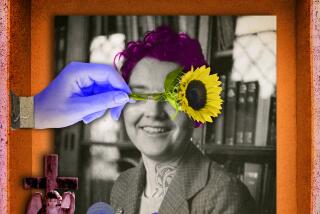Final thoughts on their passing
- Share via
Few among us, when we die, will be lucky enough to be eulogized as intriguingly as the individuals in Marion Winik’s “The Glen Rock Book of the Dead.” The slender and elegantly illustrated volume chronicles the stories of some 50 individuals the author once knew, compressing their lives and personal significance into brief, two-page essays.
The eighth book from this critically acclaimed writer and poet is a sort of modern-day version of Edgar Lee Masters’ “Spoon River Anthology” -- the almost century-old classic that told the tale of a town in the voices of its deceased.
With “The Glen Rock Book of the Dead,” Winik tells her own life story, weaving disparate memories from far-flung characters who aren’t bound by geography but by their happenstance connections to the writer -- and the fact that all of them are now deceased.
Whether it’s “the clown” who hanged himself or “the big sister” who was run over by a train, each character in the book is assigned a plain-spoken ID that, in some cases, belies the person’s emotional impact on the author.
“The skater,” for example, was Winik’s first husband; his slow death from AIDS complications was like a week with a million days, she writes. “The baby” was Winik’s first child; he “weighed less than a dinner plate” when he was born prematurely and passed away before Winik could hold him a second time. At age 50, Winik seems to have experienced more than her fair share of deaths -- a plethora of dear-and-departeds who are only partly a product of the author’s era and lifestyle.
While Winik came of age during the earliest days of the AIDS epidemic and was also a heroin user, the mind-boggling number of dead people she chronicles is enabled by the fact that she barely knew so many of them. “The eye doctor” who kicks off the collection, and who overdosed on meds, for example, was just a distant memory from a long-ago summer at a childhood sleep-away camp.
That kickoff story serves a purpose: It sets up a chronological framework for what is, in effect, a memoir told in pastiche. But “the eye doctor” is symptomatic of a problem that plagues the book. In writing about strangers who didn’t mean that much to her, as she does with roughly half the book, Winik is unable to deliver as emotional a punch as she does with the people who touched the lives of her innermost circle -- her lovers, husbands, sister and two sons.
It’s in entries such as “The Junkie,” in which Winik describes watching “her blood unfurl like fireworks in the clear liquid,” that the author’s dark whimsy shines to full effect.
Instead of mirroring her age with 50 different character studies, Winik would have done better to pick the people who meant the most to her and devoted to them her undying attention and full poetic talents.
As it is, “The Glen Rock Book of the Dead” comes off too much like a gimmick.
--
More to Read
Sign up for our Book Club newsletter
Get the latest news, events and more from the Los Angeles Times Book Club, and help us get L.A. reading and talking.
You may occasionally receive promotional content from the Los Angeles Times.









